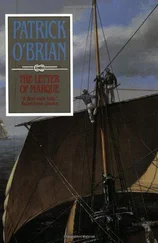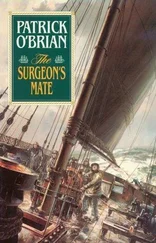Patrick O'Brian - The Wine-Dark Sea
Здесь есть возможность читать онлайн «Patrick O'Brian - The Wine-Dark Sea» весь текст электронной книги совершенно бесплатно (целиком полную версию без сокращений). В некоторых случаях можно слушать аудио, скачать через торрент в формате fb2 и присутствует краткое содержание. Жанр: Книги. Описание произведения, (предисловие) а так же отзывы посетителей доступны на портале библиотеки ЛибКат.
- Название:The Wine-Dark Sea
- Автор:
- Жанр:
- Год:неизвестен
- ISBN:нет данных
- Рейтинг книги:4 / 5. Голосов: 1
-
Избранное:Добавить в избранное
- Отзывы:
-
Ваша оценка:
- 80
- 1
- 2
- 3
- 4
- 5
The Wine-Dark Sea: краткое содержание, описание и аннотация
Предлагаем к чтению аннотацию, описание, краткое содержание или предисловие (зависит от того, что написал сам автор книги «The Wine-Dark Sea»). Если вы не нашли необходимую информацию о книге — напишите в комментариях, мы постараемся отыскать её.
The Wine-Dark Sea — читать онлайн бесплатно полную книгу (весь текст) целиком
Ниже представлен текст книги, разбитый по страницам. Система сохранения места последней прочитанной страницы, позволяет с удобством читать онлайн бесплатно книгу «The Wine-Dark Sea», без необходимости каждый раз заново искать на чём Вы остановились. Поставьте закладку, и сможете в любой момент перейти на страницу, на которой закончили чтение.
Интервал:
Закладка:
When Stephen's work was done he walked up the ladder and into the gunroom: his was not exactly a seaman's step - there was something too tentative and crablike for that - but no landsman would have accomplished it, paying so little attention to the motion in that pitching ship as she raced with a full-topsail gale three points on her quarter, her stern rising up and up on the following swell; nor would a landsman have stood there, barely conscious of the heave, as he considered his messmates' dwelling-place.
It was a long dim corridor-like room, some eighteen feet wide and twenty-eight in length, with an almost equally long table running down the middle and the officers' cabin doors opening on to the narrow space on either side - opening outwards, since if they opened the other way they must necessarily crush the man within. There was no one in the gunroom at present apart from a seaman who was polishing the table and the foot of the mizenmast, which rose nobly through it half-way along, though Wilkins, whose watch had just been relieved, could be heard snoring in the aftermost larboard dog-hole; yet at four bells the table would be lined with men eager for their supper. Dutourd was likely to be invited, and he was certain to talk: the ransomers were nearly always noisy: it was no place for a sick man. He walked into Martin's cabin and sat down by his cot. Since Martin had retired by order their relations were now changed to those between physician and patient, the physician's authority being enormously enhanced by the Articles of War. In any case a certain frontier had been crossed and at present Stephen felt no more hesitation about dealing with this case than he would have done if Martin had all at once run mad, so that he had to be confined.
Martin's breathing was now easy, and he appeared to be in a very deep, almost comatose sleep; but his pulse made Stephen most uneasy. Presently, shaking his head, he left the cabin: at the foot of the ladder he saw young Wedell coming down, soaked to the skin. 'Pray, Mr Wedell,' he said, 'is the Captain on deck?'
'Yes, sir. He is on the forecastle, looking out ahead.' Stephen grasped the hand-rail, but Wedell cried, 'May I take him a message, sir? I am wet as a whale already.'
'That would be very kind. Pray tell him, with my compliments, that Mr Martin is far from well; that I should like to move him to the larboard midshipmen's berth; and that I should be obliged for two strong sensible hands.'
The hands in question, Bonden and a powerful forecastle-man who might have been his elder brother, took a quick, seamanlike glance at the situation and with no more than a 'By the head, mate. Handsomely, now,' they unshipped Martin's cot, carrying him forward in it at a soft barefoot trot to the empty larboard berth, where Padeen had cleared the deck and hung a lantern. They were of opinion that 'the Doctor's mate was as drunk as Davy's sow, and indeed the inert relaxation, the now-stertorous breathing, gave that impression.
It was not the case, however. Nathaniel Martin had lain down in his clothes and now as Stephen and Padeen undressed him, as limp as a man deeply stunned, they saw the recent and exacerbated sores over much of his body.
'Would this be the leprosy, your honour?' asked Padeen, his low, hesitant speech made slower, more hesitant by the shock.
'It would not,' said Stephen. 'It is the cruel salt on a very sensitive skin, and an ill habit of constitution. Go and fetch fresh water - it will be to be had by now - warm if ever the galley is lit, two sponges, two towels, and clean sheets from the chest by my bed. Ask Killick for those that were last washed in fresh.'
'Salt and worse on a sensitive mind; an unhappy mind,' he added to himself. Leprosy he had seen often enough; eczemas of course and prickly heat carried to the extreme, but never anything quite like this. There were many things about Martin's state that he could not make out; and although analogies kept flitting through his mind like clues to the solution of a puzzle, none would settle or cling to its fellows.
Padeen returned and they washed Martin with warm fresh water all over twice, then laid on sweet oil wherever it would do good, wrapping him at last naked in a clean sheet: no nightshirt was called for in this steady warmth. From time to time he groaned or uttered a disconnected word; twice he opened his eyes, raised his head and stared about, uncomprehending; once he took a little water with inspissated lemon-juice in it; but generally speaking he was wholly inert, and the habitual look of anxiety had left his face.
When he sent Padeen to bed Stephen sat on. In sponging Martin he had looked very attentively for signs of the veneral disorder that he had at one time suspected: there were none. As a naval surgeon he had a great experience of the matter, and there were no signs at all. He knew, as any medical man must know, that mind could do astonishing things to body - false pregnancies, for example, with evident, tangible lactation and all the other marks of gravidity - but the lesions now before him were of another kind, and more virulent. Martin might believe himself poxed, and the belief might induce skin troubles, some forms of paralysis, constipation or uncontrolled flux, and in a man like Martin all the consequences of extreme anxiety, guilt and self-loathing; but not these particular miseries: he had seen something of the same nature in a patient whose wife was steadily poisoning him. More from intuition than any clear reasoning he expected a crisis of distress either about three in the morning, during what the Navy emphatically called the graveyard watch, when so many people die, or else at dawn.
He sat on: and although the ship was full of sound - the hissing rush of water along her side, the combined voices of all her rigging under a press of sail, the churn of the pumps, for with such a wind and such a sea she was hauling under the chains and making a fair amount of water, and from time to time the drumming of yet another squall - he was by now so accustomed to it that through the general roar he caught the strokes of the frigate's bell marking the watches through, and they often coincided with the minute silvery chime of the watch in his pocket.
He was accustomed to the room, too. At one time the frigate, as a regular man-of-war, had carried several midshipmen, master's mates and others and she needed two berths for them; now, in her present ambiguous position of His Majesty's hired vessel Surprise, engaged in an unavowable intelligence mission but going through the motions of being a privateer, by way of cover, she carried only three, and a single berth, that on the starboard side, was enough. Earlier in the voyage from Sydney Cove, when the stowaway Clarissa was discovered and instantly married to the young gentleman who had concealed her, the couple had had this larboard berth to themselves, and he had often sat with her when the weather was foul and the deck impossible; though their frequent consultations had always taken place in his cabin, where the light was better.
Dr Maturin, as the frigate's surgeon, belonged officially to the gunroom mess: in fact he nearly always lived in the great cabin with his particular friend Jack Aubrey, sleeping in one of the smaller cabins immediately forward of it, but he remained a member of the mess; and he was the only member of whom poor long-horned Oakes was not jealous. Yet he was the only member who was deeply attached to Clarissa as a person rather than as a means to an end, and the only one who could have taken her affection away from Oakes, if it was affection that the young man valued. To be sure, Stephen was perfectly conscious of her desirability; he was an ordinary sensual man in that respect and although in his long period of opium-eating his ardour had so declined that continence was no virtue, it had since revived with more than common force; yet in his view amorous conversation was significant only if the desire and the liking were shared, and early in their acquaintance it had become clear to him that physical love-making was meaningless to Clarissa, an act of not the slightest consequence. She took not the least pleasure in it and although out of good nature or a wish to be liked she might gratify a 'lover' it might be said that she was chastely unchaste. At that time no moral question was involved. The experience of her childhood - loneliness in a remote country house, early abuse, and a profound ignorance of the ordinary world - accounted for her attitude of mind: there was no bodily imperfection. None of this was written on her forehead, however, nor was she apt to confide in anyone but her physician, and she was packed off with her husband in a prize bound for Batavia amid general disapprobation. They were to go home in an Indiaman, and there, perhaps, Mrs Oakes would stay with Diana while her husband returned to the sea: he was passionately eager to succeed in the Navy.
Читать дальшеИнтервал:
Закладка:
Похожие книги на «The Wine-Dark Sea»
Представляем Вашему вниманию похожие книги на «The Wine-Dark Sea» списком для выбора. Мы отобрали схожую по названию и смыслу литературу в надежде предоставить читателям больше вариантов отыскать новые, интересные, ещё непрочитанные произведения.
Обсуждение, отзывы о книге «The Wine-Dark Sea» и просто собственные мнения читателей. Оставьте ваши комментарии, напишите, что Вы думаете о произведении, его смысле или главных героях. Укажите что конкретно понравилось, а что нет, и почему Вы так считаете.












